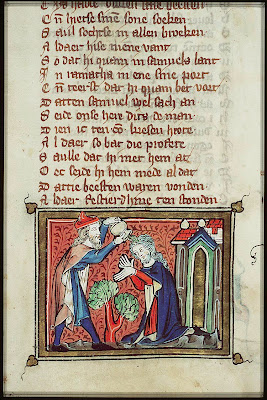So here we are, 1 Samuel 8, and our title character has already grown old. He faces the same problem that his mentor Eli did: his sons are no damn good. He has put them in leadership positions, but they are corrupt and show poor judgement. The people, seeing this and noting also the increasing strength of the hostile Ammonites, ask Samuel to appoint a king.
This really pisses Samuel off. The text doesn’t explain why he’s made, so at first you assume it’s because his sons are being bypassed. But that’s not it. Eventually, you figure out that Samuel is upset because Israelites aren’t supposed to have a king; only God is supposed to be the king. It’s a little hard to wrap your head around this, because the “Judges” have often acted a lot like kings anyway, so what’s the difference? But obviously, there was a clear and important distinction to the writer and original audience of 1 Samuel.
Samuel brings the issue to God, who tells him to warn the people what kings are like. He cuts loose with a fiery speech that anticipates the Declaration of Independence, not to mention talk-radio anti-government scree:
11 He said, "This is what the king who will reign over you will do: He will take your sons and make them serve with his chariots and horses, and they will run in front of his chariots. 12 Some he will assign to be commanders of thousands and commanders of fifties, and others to plow his ground and reap his harvest, and still others to make weapons of war and equipment for his chariots. 13 He will take your daughters to be perfumers and cooks and bakers. 14 He will take the best of your fields and vineyards and olive groves and give them to his attendants. 15 He will take a tenth of your grain and of your vintage and give it to his officials and attendants. 16 Your menservants and maidservants and the best of your cattle and donkeys he will take for his own use. 17 He will take a tenth of your flocks, and you yourselves will become his slaves. 18 When that day comes, you will cry out for relief from the king you have chosen, and the LORD will not answer you in that day."
But the people are not persuaded by this analysis, so Samuel says fine, OK, God will help me pick a king for you.
 The person turns out to be Saul, an extremely tall young man from a small clan in Benjamin, which for reasons discussed earlier is the smallest and most marginal of the twelve tribes. He runs into Samuel while out looking for some runaway donkeys; Samuel recognizes him immediately as the king-to-be, invites him to dinner, and anoints him king in private. Later, there is a public ceremony in front of the entire assembly, but Saul can’t be found at first because he is hiding in the luggage. They eventually find him and fish him out to be coronated, and this bizarre behavior is not explained or mentioned again.
The person turns out to be Saul, an extremely tall young man from a small clan in Benjamin, which for reasons discussed earlier is the smallest and most marginal of the twelve tribes. He runs into Samuel while out looking for some runaway donkeys; Samuel recognizes him immediately as the king-to-be, invites him to dinner, and anoints him king in private. Later, there is a public ceremony in front of the entire assembly, but Saul can’t be found at first because he is hiding in the luggage. They eventually find him and fish him out to be coronated, and this bizarre behavior is not explained or mentioned again.Saul, Rex
At this point, the Ammonites make their move. They besiege the city of Jabesh Gilead, and when the city elders try to negotiate a treaty, they agree on the condition that they can gouge one eye out of everyone in the town, “and so bring disgrace to all Israel.” (11:2)
When Saul hears about this, he gets very angry. He cuts a pair of oxen into little chunks, and sends the chunks out with a message that all Israelite men are to muster for battle, and that any slackers will have their oxen carved into similarly-sized pieces. This generates an excellent turnout, and Saul breaks the siege of Jabesh Gilead, routing and scattering the Ammonite army in an all-day battle.
There is a reaffirmation of Saul’s kingship at this point, with much sacrificing and celebrating, but then Samuel stands up to lay down some serious Old Testament preaching. He reminds the Israelites of all the times that God has saved their nation, and then rebukes them for having asked for a king. It’s a rebuke with teeth:
16 "Now then, stand still and see this great thing the LORD is about to do
before your eyes! 17 Is it not wheat harvest now? I will call upon the LORD to
send thunder and rain. And you will realize what an evil thing you did in the
eyes of the LORD when you asked for a king."
It is interesting to craft analogues for this conception of behavior and punishment, where you give somewhat what they want and then punish them for having wanted it. I imagine a parent telling her child that he was supposed to eat his veggies, but since he wanted candy she gave him candy instead -- but now she’s going to break his favorite toy to teach him a lesson.
Samuel finishes his speech with an exhortation for the Israelites to be more dedicated to God, and to stop being so evil. You wonder if maybe some of the people in the audience were distracted at this point by wondering how they would survive, the food supply for the coming year having just been destroyed.
Next Week: Saul takes on the Philistines


No comments:
Post a Comment